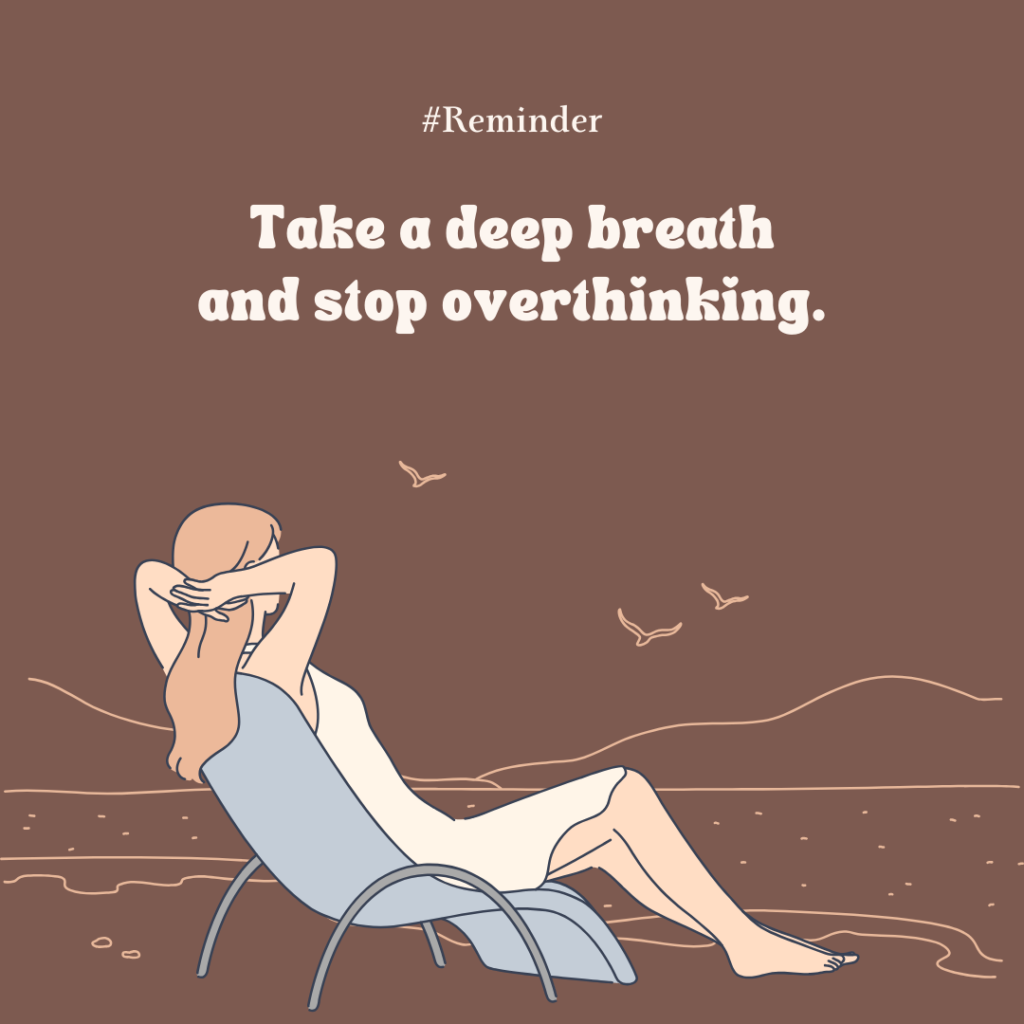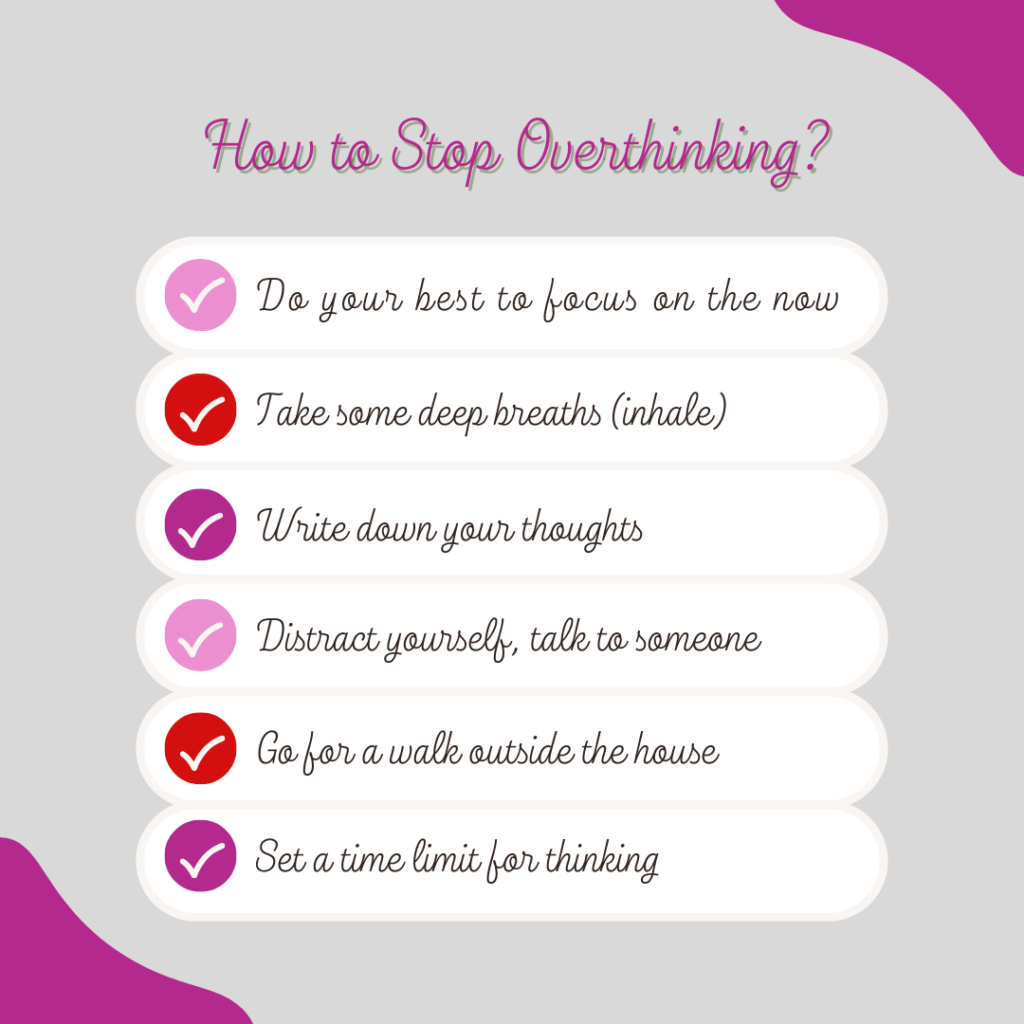“Overthinking is the art of creating problems that weren’t even there.” – Unknown
You’re lying in bed, staring at the ceiling, and replaying a conversation you had earlier that day.
You wonder if you said something wrong, if the other person misinterpreted your words, or if you should have said something else.
Maybe you’re staring at a text you haven’t sent yet, rewriting it in your head a million times, too scared to hit send.
This cycle of thoughts is what we call overthinking, and it can be a real pain!
It’s that voice in your head that makes you doubt yourself, makes you feel insecure, and keeps you hanging with “what ifs.”
Overthinking is when we repeatedly think about something so much that it makes us anxious and stressed.
It’s like getting caught in a loop, and it can stop us from moving forward.
Please do not forget to click here and follow me on Pinterest !!
Overthinking: Why Do We Do It?
We might believe that by thinking about something repeatedly, we can avoid mistakes.
However, this is rarely the case.
Here are some common reasons why people overthink:
Fear of the unknown:
Not knowing what’s coming next can be scary.
We might overthink by trying to guess every single thing that could happen.
Perfectionism:
When we aim for perfect, we might get stuck on every tiny detail, worried about messing up.
Past experiences:
If something bad happened in the past, we might overthink to try and avoid it happening again.
Low self-esteem:
If we don’t feel good about ourselves or our abilities, we might second-guess ourselves a lot.
“You can’t change what’s going on around you until you start changing what’s going on within you.” – Unknown
How Overthinking Affects Us
Overthinking can have several negative effects on our lives.
Feel Anxious and Stressed:
All that thinking makes it hard to relax and enjoy anything.
You are constantly on edge, worried about something going wrong.
Get Depressed:
Thinking negative thoughts all the time can make you feel worthless and hopeless.
It can be hard to see the good things in life when you’re caught up in negative thoughts.

Have Relationship Problems:
Overthinking conversations can make insecure with friends and family.
You might misinterpret their words or actions, leading to arguments and misunderstandings.
For example, you might read too much into a friend’s casual remark, leading to unnecessary misunderstandings or distance.
Fear of Failure:
Being scared to act because of “what ifs” which keeps stopping you from taking action.
You might refrain from trying new things because of the fear of failure.
When we overthink, we are so caught up in our thoughts that we can’t make decisions or take action.
For instance, you might spend so much time weighing the pros and cons of a decision that you end up missing the opportunity all together.
RELATED:
–HOW TO STOP WORRYING ABOUT WHAT OTHERS THINK
–HOW TO STOP NEGATIVE THOUGHTS

Ways to Stop Overthinking
Set Time Limits for Decisions
Set a time limit.
Give yourself a reasonable amount of time to think about the decision, then make a choice and stick to it.
For example, if you’re deciding what to wear to an event, give yourself 10 minutes to choose an outfit and then move on.
Focus on now
When you find yourself overthinking, take a moment to pause and bring your attention back to the present.
Try mindfulness.
You can do this by focusing on your breath, paying attention to your surroundings, or doing some physical activity like walking or stretching.
Challenge Your Thoughts
When you start to overthink, challenge your thoughts.
Ask yourself questions like: “Is this thought realistic?”
“What proof do I have for this?”
“Am I thinking the worst without any proof?”
This can help you separate fact from fiction and stop you from worrying.
Write It Down
Journaling can be a great way to process your thoughts and feelings.
Writing down what’s on your mind makes things clearer.
It can also be a way to release pent-up emotions and break the cycle of overthinking.
Do things You Enjoy
Distracting yourself with activities you enjoy can take your mind off overthinking.
Engaging in enjoyable activities can shift your focus and improve your mood.
Seek Professional Help
If overthinking is impacting your life a lot and you’re finding it hard to manage on your own, consider seeking help from a therapist or a counselor.
ALSO READ: TOP SELF LIMITING BELIEFS

Real-Life Example: My Story
As a lifestyle blogger, I often find myself overthinking my blog posts and content strategy.
I worry that my articles aren’t engaging enough and spend hours revising them, which leads to missed publishing schedules and increased stress.
So I decided to set time limits for my blog post revisions.
I gave myself one hour to make changes and then moved on to the next task.
I also started practicing mindfulness by taking short breaks throughout the day to focus on my breathing.
When I caught myself worrying about a blog post, I challenged my thoughts by asking, “Why do I think that this post isn’t good enough?”
I found that my worries were often baseless and were due to my fear of not meeting my readers’ expectations.
I limited my time on social media and blogging forums, which often made me feel not good enough.
Instead, I spent more time on activities I enjoyed, like reading and spending time with my family, which helped me relax and clear my mind.
As a result I am able to reduce my overthinking, meet my deadlines most of the times, and also enjoy blogging !!
“Sometimes you just need to breathe, trust, let go, and see what happens.” – Mandy Hale

When friends share posts, they are telling Google that the site is worth sharing with
others, and that helps build my small blog business.
Thank you for sharing !!


